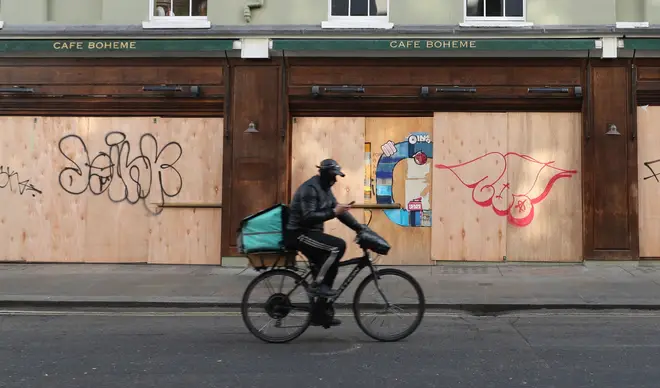
Paul Brand 10am - 12pm
14 November 2020, 13:01 | Updated: 14 November 2020, 13:14

The next two weeks will be "absolutely crucial" in ensuring England's second national lockdown ends when planned, according to one of the government's scientific advisers.
Professor Susan Michie, a member of the Scientific Advisory Group for Emergencies (Sage), urged the public to adhere to coronavirus rules so people can "be in a position" to spend the festive period with their families.
England's second nationwide lockdown is set to end on 2 December. However, ministers have previously refused to rule out an extension to the measure as the nation remains in the grips of a second-wave of Covid-19.
The professor also warned that talk of a vaccine being near-ready could lead to complacency, adding that the drug will make "no difference" to the current spike in cases.
It comes after documents released by Sage on Friday warned that a return to the tiered system of Covid restrictions will see infections rise again.
Read more: London gym owner blockaded by police to be taken to court
Read more: UK records highest ever number of daily coronavirus cases

Moment police break up party at Cardiff halls of residence
When asked what should replace the current measures when lockdown ends, Prof Michie told BBC Radio 4's Today programme: "It's too early to know. I think the next two weeks is going to be absolutely crucial.
"They're going to be a very challenging two weeks, partly because of the weather, partly because, I think, the promise of a vaccine may be making people feel complacent.
"But the vaccine is very unlikely to come in until the end of the year or beginning of next year and that's going to make no difference to the current second wave.
"So I think for the next two weeks, everybody has to really get all their resolve together."
Read more: Liverpool FC star Mo Salah tests positive for coronavirus
Read more: Pilot to give family members Covid tests for care home visits

Sunak: Virus rules have significant impact on economy
Prof Michie, a behavioural scientist at University College London, encouraged the public to "really pay attention to resisting any urges to break" social distancing rules, such as by visiting other households.
"Because that will maximise the chance that in two weeks' time, on 2 December, we're in a position where actually we don't have to continue the lockdown," she added.
"And better still, what everybody wants, is to be in a position where they can spend the Christmas and winter holiday times with loved ones."
When pressed on whether this meant the gains during lockdown would be lost, Prof Michie said she was "quite hopeful" after tough measures in Wales and Northern Ireland brought transmission rates down.

This is the moment police break up a makeshift gym in Harlow, Essex
Newly-released documents, written the day before the second national lockdown was imposed, show a consensus statement prepared by a modelling subgroup of Sage raised concerns about returning to the tier system.
Modelling found that if the lockdown is "well-adhered to", it is likely to reduce the reproduction number to less than 1, with hospital admissions and deaths expected to fall until at least the second week of December.
But the document, dated 4 November, added: "If England returns to the same application of the tiering system in place before 5 November, then transmission will return to the same rate of increase as today."
Other documents from late October state that any hopes of families gathering at Christmas will also be dependent on the R value staying below 1 for "some time".

Boris Johnson: Anti-vax is total nonsense, you should get a vaccine
On Friday, Sage said that the R rate for the UK has fallen to between 1 and 1.2, with experts believing it is already below 1 in some places.
It is hoped that R will drop in more places next week or the week after, as people remain under lockdown restrictions.
Elsewhere on Friday, the government said a further 376 people had died within 28 days of testing positive for Covid-19.
As of 9am on Friday, there had also been a further 27,301 lab-confirmed cases of coronavirus in the UK, compared to 33,470 on Thursday - the highest daily figure the country has recorded so far.
Listen & subscribe: Global Player | Apple Podcasts | Google Podcasts | Spotify